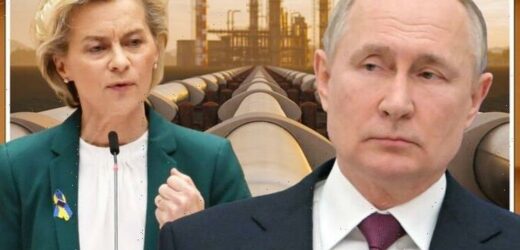Boris Johnson discusses EU's 'addiction' to Russian oil and gas
We use your sign-up to provide content in ways you’ve consented to and to improve our understanding of you. This may include adverts from us and 3rd parties based on our understanding. You can unsubscribe at any time. More info
The European Commission’s masterplan to escape Putin’s energy grip may involve boosting Europe’s renewable infrastructure and diversifying its gas supply, according to a leaked document seen by EURACTIV. A new regulation might also require countries to make a legal commitment to guarantee a minimum level of effective storage by September 30 avoid winter supply problems. It comes as EU gas storages have reached “historically low levels”.
This has sparked concerns about the security of supplies linked to “low debit in the gas pipelines from the East”, according to the document.
It adds: “We witness a growing gas crisis. The EU remains highly dependent on energy imports for power generation and heating.”
Panic soared over a supposed shortage of gas reserves at storage facilities in tight supply as the bloc reportedly did not build up its stocks in 2021.
But the crisis was made worse as Putin reportedly slashed gas deliveries transiting into the bloc in a move that sent prices skyrocketing to record highs.
Up to 40 percent of Europe’s gas supply comes from Russia, laying bare the tight control Putin has on the continent’s energy market.


Since December, gas flowing through the Yamal-Europe pipeline has been diverted East, sending surging above October records seen from earlier squeezes.
There were also fears that Putin could completely slash Europe’s gas over its “full-scale invasion” of Ukraine to fight back against harsh western sanctions.
But the EU is scrambling to make sure that Putin’s move won’t hurt it.
The document leaked from Brussels reveals that average stocks in the EU as a whole should be kept at least 80 percent as a minimum level of storage in case supply problems arise.

Despite Russia squeezing Europe’s pipeline gas, unprecedented deliveries of liquefied natural gas (LNG) helped to soften the blow, although it was imported in at a higher price.
James Waddell, head of European gas at consultancy Energy Aspects, said: “Europe received a record 13.15 billion cubic metres of LNG send-out in January after Asia stopped competing for Atlantic basin cargoes.”
And the EU now looks to be looking to increase the range of its suppliers to slash its reliance on Putin.
The leaked document reportedly welcomes imports of (LNG), sent from the United States and Qatar as alternatives to Russia’s gas.
The draft reportedly says: “Reducing our dependence on a single fossil gas supplier requires diversification of gas supply and using the full potential of green and low-carbon energy sources.
DON’T MISS
Pakistan and Russia strike gas deal as pair form ‘new world order’ [REPORT]
Scholz to send Ukraine 2,700 soviet-made weapons [REVEAL]
Russia nuclear threat: Putin to launch missile TOMORROW [INSIGHT]

“LNG, which can be transported by ship or road, has proven to be an important element in reducing our dependence on Russian gas and strengthening security of supply,”
Barbara Pompili, French Minister for the ecological transition, said: “Next winter, the member states and the Commission will step up their coordination to reinforce our capacity for importing LNG for instance.
“We will have to use our terminals as best we can, we have to fill those terminals, we have to increase our stocks.
“And we have to have more trade with exporting producer countries.”

The EU also wants to ramp up its investments in renewable energy structure to diversify its energy sources.
One measure involves the “Hydrogen Accelerator”, an attempt to speed up the roll-out of renewable hydrogen.
The draft mentions striking a new “energy compact to slash gas imports and scale up. Its renewable investments.
It claims that if it sticks to its 2030 climate pledges, it could slash its reliance on gas by 23 percent by the end of the decade.
Source: Read Full Article

